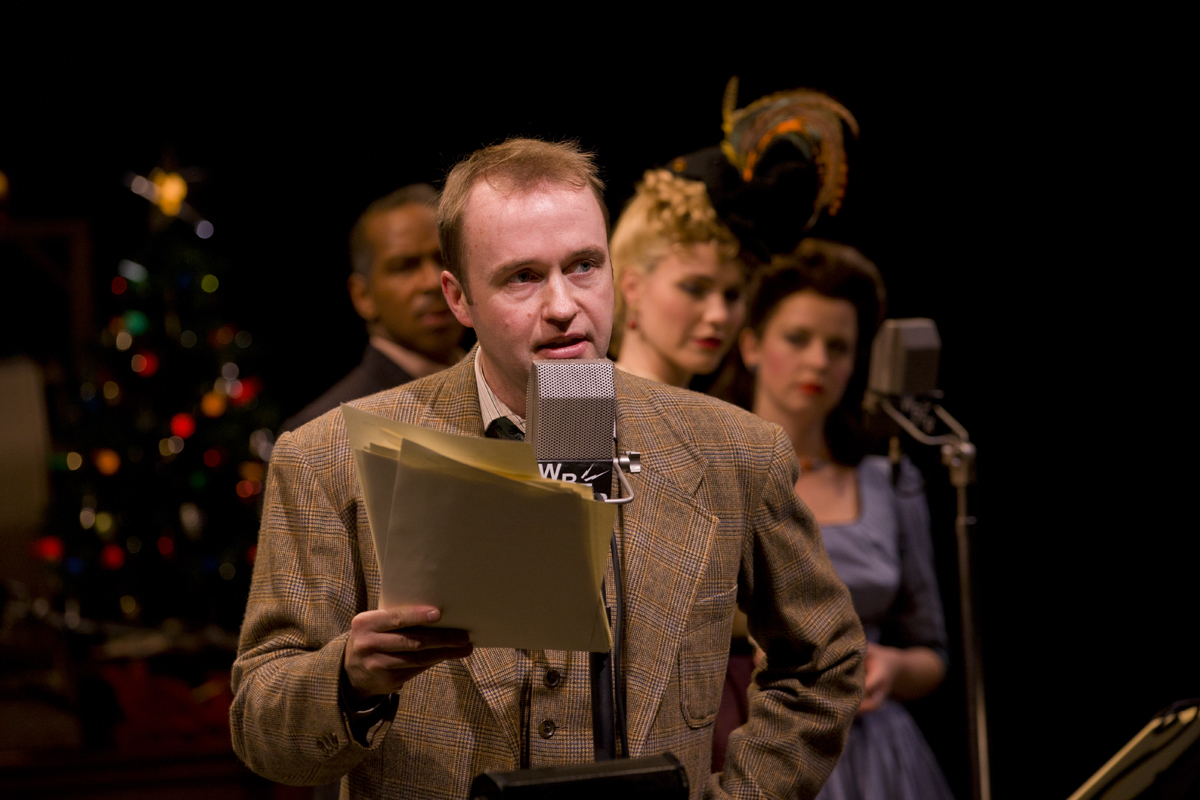Director Eric Ting of the Long Wharf set himself a considerable task this holiday season: how to defamiliarize the overly familiar? It's a Wonderful Life, the seasonal chestnut roasting on televisions all over the U.S. at Christmastime as a cinematic classic from Frank Capra starring wholesome Jimmy Stewart and winsome Donna Reed, has been re-imagined as a radio play by CT writer Joe Landy. Added to that is a frame in which Alex Moggridge experiences the radio performers as ghosts of Christmases--and an America--past. He's alone in a dusty old radio station when performers from the WWII era of Capra's film parade into the place; they enlist him to play the part of the story's hero, George Bailey. The story, as "everyone" in America knows, is about a dark night of the soul for George, the long-suffering director of a Building and Loan concern in Bedford Falls, NY; George is a champion of the 99% in constant battle with the local one percenter, the grasping, covetous old curmudgeon and evil banker Mr. Potter. When his likeable uncle Billy, a business liability if there ever was one, misplaces a considerable sum, George faces ruin at the hands of Potter. George's neck is on the chopping-block and he's about to end it all when to his rescue arrives a simple-minded angel called Clarence. The remedy for George's "life isn't worth living" attitude: a glimpse of what the world would be like had he never existed.
As its fans know, a joy of the film is the supporting roles and the character actors who played them, long since having burned their deliveries into our brain cells. This Life keeps up a running dialogue with the voices we know so well--Dan Domingues's Old Man Potter is a spot-on recreation of Lionel Barrymore's memorable performance, played for laughs this time. Moggridge has the more daunting task of delivering his lines without echoing or mimicking or mocking Jimmy Stewart, who owns them, and it's to his considerable credit that he manages to do so. The "play as cast" aspect of his incorporation into the radio play works to his advantage: he doesn't have to play George Bailey so much as play a guy forced to play George--the pre-existence of the role is a given. It's an interesting way of underlining the "everyman" (or anyman) aspects of George.
And that's what makes the frame conceit and the radio play staging such brilliant touches. As a radio play, we're watching superb "voice actors" perform a show that radio listeners would only hear--and that's endless fun in itself thanks to the authentic set by Mikiko Suzuki MacAdams, and the radio-era costumes by Jessica Ford, and due particularly to the tirelessly precise and unbelievably busy foley artist (aka, sound effects man) Nathan A. Roberts, an entertaining one-man-show in his own right. Staging-wise, the show is a lesson in "how do they do that," and simultaneously a "behind-the-scenes" view (what we see onstage) and a successful enactment (what we hear).
But there's a third level: the sights and sounds of the film already implanted in the minds of many in the audience are invoked and distorted by what we see and hear. No one on stage "is" actually the character they're playing--indeed, it's great fun to see/hear various characterizations, as for instance angel Clarence; Italian bar owner Mr. Martini; an Irish Buildings and Loan boardmember; younger brother Harry Bailey; and a few others, all come from one man: Kevyn Morrow. Ditto Kate MacCluggage as George's mom, daughter, local goodtime gal Viola, and uncle Billy's bird.
A further spin is provided by Ariel Woodiwriss, as Mary Bailey (née Hatch), the love of George's life; every bit as winsome as Donna Reed, she seems at times to "be" Mary, in search of her George, who might just be Moggridge. Indeed, during the segment when George visits a Bedford Falls in which he has never existed, Moggridge is alone on stage, and the voices of the others, and the sound effects, respond to him as though he is haunted by them. It's a nice Twilight Zone-style touch that makes It's a Wonderful Life become, like the Christmas season itself with its overlay of memories, a space that we might find ourselves inhabiting willy nilly. The lesson learned there: the richest man is not the one with the most money in the bank but the one with a community behind him.
Warmly nostalgic with a slightly modernist twist, It's a Wonderful Life is enthralling entertainment.
It's a Wonderful Life Stage play by Joe Landy; adapted from the film script by Frances Goodrich, Albert Hackett, Jo Swerling, Frank Capra Directed by Eric Ting The Long Wharf Theatre December 7-31, 2011


